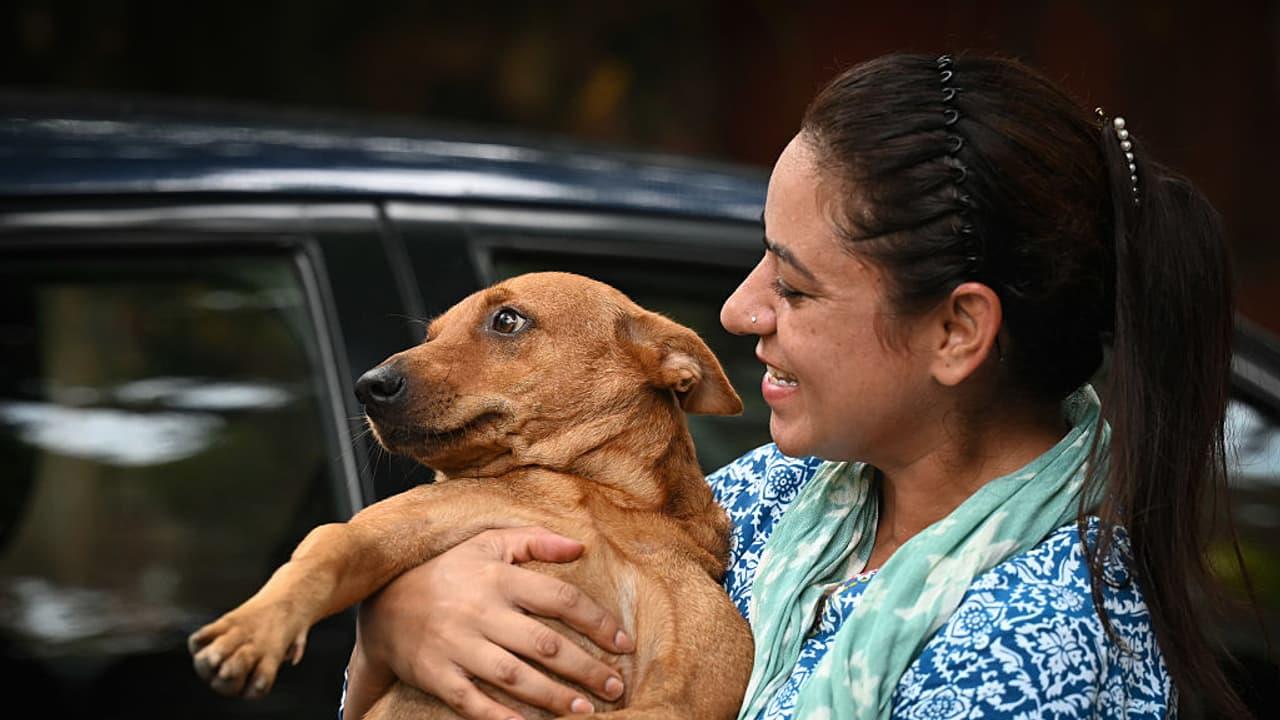
Stray Dog Issue: Delhi Govt Makes Registration Of Pets Mandatory, New Rules Announced
New Delhi: Amid the heated discourse around Supreme Court's deliberations on the stray dog issue, the Delhi government has rolled out comprehensive guidelines to regulate street dog population management, rabies eradication, and reduction of human-dog conflict. The notification, issued under the Prevention of Cruelty to Animals Act, 1960, the Animal Birth Control (ABC) Rules, 2023, and in compliance with directions from the Supreme Court and the Delhi High Court, seeks to standardize humane practices while ensuring public safety. In a significant step, all pet dogs above three months of age must be registered with local bodies. Registrations will be valid for one year and automatically lapse if anti-rabies vaccination expires guidelines further direct that dogs suspected of rabies or displaying violent behavior be captured and kept under observation at ABC Centres. Rabid dogs will be isolated until natural death, with carcasses disposed of scientifically. Non-rabid or normal dogs are to be sterilized, vaccinated, and released back to their original locations. Habitually aggressive dogs may be permanently housed at private shelters empanelled with AWBI-recognized welfare organizations. Local authorities must launch public awareness campaigns in collaboration with schools, NGOs, and animal caregivers to educate citizens about dog behavior, responsible interaction, sterilization, vaccination, and feeding practices.
What Are The New Rules?
One of the most significant guideline is about pet registration and ownership rules. The guidelines divide dog registration into two categories: breeding dogs, allowed only in commercial areas with certification from the Delhi Animal Welfare Board, and non-breeding dogs, which are sterilized pets. Residents adopting Indian dogs get free registration, sterilization, and first vaccination, while all non-breeding dogs must be sterilized by one year and all dogs need annual vaccination certificates.
The new rules align with the Revised Animal Birth Control Module released by the Animal Welfare Board of India (AWBI) and assign responsibility to the Municipal Corporation of Delhi (MCD), New Delhi Municipal Council (NDMC), and Delhi Cantonment Board (DCB). At present, MCD operates 20 Animal Birth Control (ABC) Centres through NGOs, and the Delhi State Animal Birth Control Monitoring Committee has been tasked with enforcing a uniform operational structure. According to the guidelines, local bodies must engage only those Animal Welfare Organizations (AWOs) recognized by the AWBI, ensuring that veterinarians, handlers, and para-veterinary staff undergo training at the AWBI-run ABC Training Centre. No authority or AWO may conduct sterilization drives without a Certificate of Project Recognition from AWBI. Each ABC Centre must maintain infrastructure including:
- Kennels with isolation/quarantine facilities Fully equipped operation theatres with power backup Specially designed vans for dog transport Incinerators or deep burial systems for carcass disposal CCTV surveillance in kennels and operation theatres (recordings preserved for 30 days) Detailed records of capture, release, sterilization, vaccination, feeding, and medication
Local authorities are required to reimburse expenses for sterilization and vaccination, verified through organ counts post-surgery as mandated under Rule 17. They must also:
- Establish Local ABC Monitoring Committees as per Rule 9 Inquire into violations of the ABC Rules and suspend non-compliant AWOs Ensure monthly and annual reporting to AWBI Conduct periodic verification of sterilization counts Guarantee that no street dog is relocated or killed
Limitations for Feeding Stray Dogs
The guidelines also address one of the most contentious issues in the Supreme Court debate, feeding of stray dogs. Under Rule 20 of the ABC Rules 2023:
- Each ward must designate official feeding points in consultation with RWAs and residents. Feeding should avoid areas frequented by children and senior citizens, with strict cleanliness and safe disposal of leftovers mandated. Caregivers are expected to volunteer in sterilization and vaccination drives. Only identified feeding spots will be permitted, with clear signage, and violations may invite action. Harassment of caregivers, especially women, seniors, or community feeders, will be treated as a serious offence.
Conflicts over feeding locations will be resolved by the designated committee, with appeals to the Delhi Animal Welfare Board permitted. RWAs ensuring well-managed feeding points will be recognized and rewarded by the government.
Legal Disclaimer:
MENAFN provides the
information “as is” without warranty of any kind. We do not accept
any responsibility or liability for the accuracy, content, images,
videos, licenses, completeness, legality, or reliability of the information
contained in this article. If you have any complaints or copyright
issues related to this article, kindly contact the provider above.
















Comments
No comment